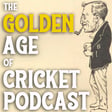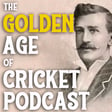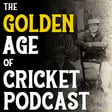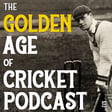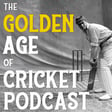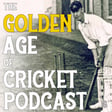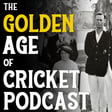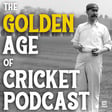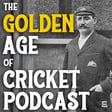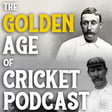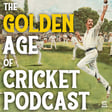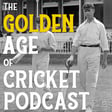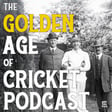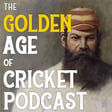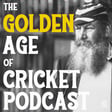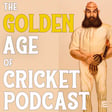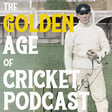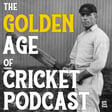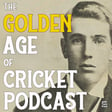Introduction and Focus on Warwick Armstrong
00:00:08
Speaker
Hello and welcome to this episode of the Golden Age of Cricket podcast, a show where we revisit the characters, statistics, matches and tales of that cricket period immediately preceding the First World War. My name is Tom Ford.
00:00:23
Speaker
When it comes to giants of Australian cricket, there are few who stand larger than Warwick Armstrong. Described as the WG Grace of the Antipodes, he was an all-round phenomenon, whose stature in cricket, both physically and figuratively, has rarely been surpassed.
00:00:40
Speaker
Emerging in the first years of the twentieth century, he defied many of the game's oldest laws and customs, played cricket to win, regardless of its spirit, and stood firm against an emerging dictatorial cricket establishment.
Armstrong vs. WG Grace and Early Years
00:00:55
Speaker
When he retired after leading the all-conquering 1921 Australians in England, he was universally praised as a champion of the game. But it's his early years as a lanky defiant all-rounder in the golden age of cricket which concerns us today.
00:01:11
Speaker
My guest in this episode needs little introduction.
Gideon Haig on Armstrong's Influence
00:01:15
Speaker
Gideon Haig has written close to 50 books and contributed to more than 100 publications, including The Times of London, The Guardian, The Times of India, and The Australian. His 2001 biography, The Big Ship, Warwick Armstrong, and The Making of Modern Cricket, was awarded the Jack Pollard Trophy. And it's my absolute pleasure to welcome Gideon to the podcast today. Gideon, hello. Hello, Tom.
00:01:41
Speaker
Nice to be back talking about Warwick Armstrong, 25 years after I wrote this book. But we'll be testing the limits of my memory. But look, he is a memorable cricketer. And when I wrote the book, I called it Warwick Armstrong and the Making of Modern Cricket. I use that advisedly because I think he does anticipate many of the dilemmas that cricket continues to face about
00:02:07
Speaker
How far is too far when you're taking the game to the limits of the laws and its underlying spirit? You're on record as saying, and I quote, I'd always wanted to read a book about Warwick Armstrong, but it seemed unlikely I would have the opportunity unless I wrote one myself.
Armstrong's Defiance Against Cricket's Chivalry
00:02:30
Speaker
Why do you think writers avoided choosing Armstrong as a subject for so long?
00:02:37
Speaker
It's a good question. There was a pamphlet written by Rad Grace who was the president of the Australian Cricket Society in Victoria for some years. That was the only book that was around and it was pretty sketchy and mainly taken from secondary sources. I think
00:02:58
Speaker
I mean, he's not an immediately appealing personal figure in the way that, you know, a winsome Trump or a dignified noble or a pugilistic Joe Darling is from the Golden Age. He actually makes a slightly ironic fit with the Golden Age, which is, you know, defined in terms of its
00:03:22
Speaker
chivalry and its sportsmanship and its amateur grace and its expansiveness by writers like Neville Carlos. He was always somewhat against the grain of our received image of that period. But in fact, you know, when you begin to pursue his life, you begin to see the Golden Age is much, much more complex.
00:03:46
Speaker
phase of cricket history than the gilded name suggests. It's got all the same kind of tensions between sport and commerce and sportsmanship and
00:04:03
Speaker
graciousness on the field. There's a pretty strong economic underpinning to a lot of the decisions that are made. There's constant arguments between the game and an emerging class of bureaucrats.
Research Challenges Before Trove
00:04:18
Speaker
And Warwick Armstrong kind of dramatizes those dilemmas and takes them into the period after the First World War as dramatically as anyone in the history of the game.
00:04:30
Speaker
You wrote your book published in 2001, which was obviously before the era of Trove, which we all rely on these days for Australian sources, newspapers. What primary sources were of most help to you when writing this? Was Armstrong, for example, a prolific letter writer or diarist? No, not at all. Not at all.
00:05:00
Speaker
And thank you very much for pointing that out. I did an awful lot of scrolling through microfiches at the State Library of Victoria to put together the newspaper sources. You know, they were hard to get in those days. So I spent a lot of time in the dark and got a very sore right arm from from cranking the microfiche machine around.
00:05:20
Speaker
Actually, I mean, there is a lot to be said for that style of research. Sometimes I think the keyword search gratifies us a little bit too quickly. We lose touch of the context of the material that we're looking for. One of the fascinating features of looking at whole pages of newsprint rather than
00:05:43
Speaker
single articles is that you get a sense of the period, what else people were thinking about, the general sort of social attitudes, contemporaneous news events. You get a stronger sense of what it was like to be there. And in those days, of course, newspapers were genuine journals of record. There were no other competing media.
00:06:10
Speaker
There was a general sort of fidelity to fact in reporting. You were genuinely crafting the first draft of history.
00:06:18
Speaker
And even though Australia was a long way from the rest of the world, it was part of a larger imperium. So you were capable of looking at the sort of entire Anglo sphere. As far as other collections were concerned, no, Warwick was not a particularly prolific letter writer. I don't think I ever actually spied a letter from him. There was a fascinating collection of letters to do with the Big Six dispute.
00:06:46
Speaker
which David Firth gave me access to, letters to and from Clem Hill from 1912. Fantastic collection of photographs by Frank Leyva, the Frank Leyva collection at the Melbourne Create Club. Sid Smith, who was the manager of the 1921 tour of England, had pretty compendious papers at the State Library of New South Wales.
Armstrong's Community Involvement and Personality
00:07:11
Speaker
When it came to looking at contemporaries of Warwick's New South Wales archives had material on the bankruptcy of Sid Gregory which was fascinating, a real sort of slice of life of the life of an Australian cricketer of that period.
00:07:30
Speaker
UDV Archives had access to materials to do with Warwick's post cricket career, where he was an agent for Peter Dawson Limited, the whisky manufacturer. And of course, there were the papers of the manuscript collections of the Victorian Cricket Association and the Melbourne Cricket Club. They were great record keeping organisations, particularly the MCC.
00:07:56
Speaker
and particularly so where Warwick was concerned, because Warwick was the Pavilion Clerk at the MCC from 1910 onwards. So his whole life was cricket from that stage of his career onwards. He was intensely involved with
00:08:15
Speaker
every aspect of cricket organisation and cricket's community. He knew everyone. It was a pretty relatively small and close-knit community. The players were particularly clannish in that era. And the Melbourne cricket scene, which was dominated by the Melbourne Cricket Club, basically the same characters were in constant circulation for about 20 years. Warwick knew all of them. Warwick had probably had an argument with all of them.
00:08:43
Speaker
Warwick had been forgiven by all of them because he was such a great cricketer. So it was an unfolding, almost a family saga that I was chronicling in the course of Warwick's career.
00:08:56
Speaker
It's a nice segue there because you touched on his, at times, prickly personality. Gideon, for any biographer who spends a considerable amount of time with their subject, it can be hard not to become quite enamored with their personality, I suppose, over time. But reading your book, I was left with the impression that
00:09:21
Speaker
You weren't left with the great impression of his personality. Is that a fair assessment? Well, I was impressed by the forcefulness of his personality, by his stubbornness and obduracy, by his unapologetic nature.
00:09:40
Speaker
by his charisma. I think he had a lot of charisma. He was a great leader of men. Other cricketers gravitated to him. He was an inspired choice as Australian captain post the First World War. And a lot of cricketers who were hard to impress otherwise regarded him as the best captain that they ever played under.
00:10:01
Speaker
I think it was one of the reasons why I chose Armstrong as a subject, though, was that he was such a contrast to the player whose biography I had just written, which was Jack Iverson for Mystery Spinner. For those of you who read Mystery Spinner, you'll know that Jack is a very enigmatic character, a rather sensitive man who never considered himself to be
00:10:25
Speaker
a cricketer. He felt like an interloper on the cricket scene. He was possessed of one astonishing gift, but probably the rest of cricket was a bit of a mystery to him.
00:10:40
Speaker
His career was short. He left a lot of questions hanging. He said very little in the course of his life about his approach to the game, and he perished in tragic circumstances. Well, if you're looking for an opposite in every respect, you'd be hard pressed to go any further than Morrig Armstrong, a man who knew his value to the last
00:11:05
Speaker
a man who never took a backward step against any administrative encroacher, a man who didn't care who antagonized in the opposition, a man who dominated every cricket field that he stepped onto with bat ball in the field, a man who always wanted to be involved, who was absolutely sure of his abilities. There's something kind of
00:11:37
Speaker
compelling about that when it comes to writing about them. And I don't think it's necessary for you to become enamored of a subject in order to appreciate them. Certainly, I don't think I would have enjoyed spending time in Warwick's company, but that doesn't prevent me from appreciating him from a distance. Perhaps distance is where he's best appreciated from. Sort of the gap of about 80 years made it possible to view him in appropriate and safe perspective.
00:12:07
Speaker
and 80 years better than say 22 yards, which we will get to down the track regarding his bowling. Fascinating insight there Gideon, thank you. But let's return right to the beginning now and I'm going to test your memory.
Armstrong's Rise in Cricket and Melbourne Club Alignment
00:12:27
Speaker
Warwick Windridge Armstrong was born in the Victorian town of Kainton on the 22nd of May, 1879.
00:12:35
Speaker
What or rather who were Armstrong's early cricket influencers? And was he a immediate cricket success or a prodigy? Look, I mean, every significant player shows promise at an early age. Warwick was playing from his youth. He played with Corfield Cricket Club.
00:13:04
Speaker
Ironically, it was very near to where I live. This is one of the reasons why history can be kind of fascinating in the sense that you're often walking around the same parts of a city that your historical character was familiar with. When I started writing this book, I was living in Balaclava Road, North Corfield, and it turned out that Warwick's childhood home had been just around the corner.
00:13:32
Speaker
Immediately across the road from that was Caulfield Park and there were still Warwick's names on various trophies there in the pavilion. So in some respects, even though I was 80 years removed, it was almost as though I could simply reach out and touch him. I think he played his first significant cricket at school for a school called Cumloden, a now long vanished small private school.
00:14:00
Speaker
He also played at University College. He played at St Kilda Creek Club. That was where he played his first games. He then went to South Melbourne, which was the club of the Australian captain Harry Trott.
00:14:21
Speaker
But then he gravitated towards the Melbourne Cricket Club at the first sign of promise. Now, the Melbourne Cricket Club has always been a powerful club, both on the field and off. But we're probably talking about Melbourne at the zenith of its influence in the Australian game. It was the de facto seat of government in Australian cricket. We're talking about a period before the advent.
00:14:45
Speaker
the Australian Board of Control, where the associations, the state associations are disunited and starveling bodies with no assets of their own and no access to the revenues that international touring cricket was making available to the players. It's a player-led cricket economy
00:15:08
Speaker
So by moving to the Melbourne Cricket Club, Warwick was aligning himself with the most powerful presence in the cricket land. And frankly, it kind of suited him to be on the side of this mighty establishment because he became a mighty establishment in his own right. So it wasn't a mere coincidence that he moved clubs to the Melbourne Cricket Club. He actually wanted to align himself with a powerful body.
00:15:38
Speaker
Well, I think Melbourne was powerful and prestigious and successful, and it was always on the hunt for cricket talent. This is the days before residential boundaries had been established for district cricket, so you could move pretty much where you liked. And if there was a young player around showing promise, as Warwick was, as an all-rounder at South Melbourne, then Melbourne was bound to come calling.
00:16:05
Speaker
course in due course his alignment with Melbourne was to create problems for him because of the desire to found an independent freestanding national cricket body to which Melbourne was automatically by definition a resistor.
Armstrong's Multi-Sport Talents and Football's Role
00:16:26
Speaker
Live us all the way to China, in Carolina. Come back, New Carolina Dinaly.
00:16:38
Speaker
One of the things I love most about the Golden Age or the so-called Golden Age Gideon is that the prominent characters from this period don't limit themselves to one sport. I was chatting with Bernard Wimpress the other day and he was reminding me about the likes of Clem Hill, won a football premiership with South Adelaide,
00:17:03
Speaker
Joe Darling played for Norwood and of course Warwick Armstrong famously also played Australian Rules football and reached the grand final of the Victorian Football League competition playing for South Melbourne in 1899.
00:17:22
Speaker
And there's a there's a wonderful team photo, as they always sat for before the match. And he's at the back, of course, in the middle, looking quite the opposite of the figure we came to know him as he's very thin. Yes. But it but it's just a wonderful thing to remind ourselves that cricketers in those days weren't
00:17:49
Speaker
specialist so to speak. Do you think he took his football seriously in those days?
00:17:57
Speaker
I think Warwick took everything seriously. There wasn't a lighthearted bone in Warwick's body. I think in those days, of course, the seasons were safely subdivided, so there was no overlap between them. There was no expectation that you would train for one sport through the off-season of another. Of course, Australian rules football had been designed originally to keep cricketers fit in winter. So in that respect, Warwick was following in a great tradition.
00:18:23
Speaker
and a tradition that lasted a good deal longer. Of course, Ted McDonald managed to play in the grand final for Fitzroy. And cricketers and footballers have overlapped well into the 1980s. I think he was a good footballer rather than a great footballer.
00:18:40
Speaker
Football was a pretty tough and physical and low scoring game in those days. It was hard to be an outstanding player. It was a slow-moving game. It was not particularly athletic. It was a game of strength. It was a game of man-on-man contest.
00:18:58
Speaker
And as you say that Warwick's physique in those days probably wasn't conducive to a long career in the game. Certainly having played in that grand final, he doesn't stick around for very much longer. And cricket
00:19:14
Speaker
very soon becomes his solitary pursuit.
Armstrong's Career Beyond Cricket
00:19:18
Speaker
Of course, it's in, you know, he's just about to make his debut for Victoria. He's just about, he's within a couple of years of playing cricket for Australia and after a while the need to tour over winter is going to preclude him doing anything much but play cricket.
00:19:38
Speaker
And anything but cricket indeed, what was he doing outside of cricket in terms of a professional career? And did he particularly follow in one area? I mean, was he interested in anything outside of cricket? No, the short question that is no. His careers, such as they were, his periods of employment were intermittent, were a means to an end. They are a
00:20:07
Speaker
making money when he wasn't playing cricket. Because frankly, if there was a game of cricket around, Warwick wanted to be involved in it. One of the fascinating things about putting together Warwick's career, and I did my best to create a kind of a chronology of all the games in which he played, was just how incredibly busy he always was playing cricket. Now, if there was a game around of any description, of any competitive nature, whether it was
00:20:36
Speaker
an MCC team going to play in the country somewhere, or a second 11 game in pennant cricket, or a test match, or a tour match, Warwick always wanted to be involved. He's an astonishingly, not just durable cricketer, but an active cricketer. And he wants to dominate every game in which he's involved. He's not a man who gets bored by making runs or taking wickets in any context.
00:21:05
Speaker
that he must have ruined so many games against junior oppositions just simply by going out and grinding out massive hundreds and bowling unchanged at one end. He's got a George Giffen-like attitude to the game. He wants to be involved at every stage. So his periods of employment, he's got a period in the post office, he had a period in the home affairs department.
00:21:34
Speaker
He's punching the clock. He can't wait to get to cricket. He can't wait to get to practice. He can't wait to be involved. It's almost as though when he's not on the cricket field, he's not completely alive. He has periods where he's an amateur and where he's a professional. He seems to regard that distinction as arbitrary and
00:21:57
Speaker
and just a matter of words, which is odd because cricket certainly in England and to some degree in Australia was preoccupied with that distinction. It's almost as though we had a similar hang up about the idea of a player being reliant on the game for their income, whether they could play it with complete freedom.
00:22:23
Speaker
but Australians response to that distinction was always more pragmatic and no one was more pragmatic than Warwick.
Anecdotes and Armstrong's Love for the Game
00:22:33
Speaker
You missed the opportunity there, Gideon, to mention perhaps one of the most famous cricket matches he played in. And indeed, it adorns the cover of your book, where he played against 10-year-old boys. It was 3 versus 22. And if anyone knows your book, of course, they'd recognize the cover where he's standing with these two young boys, probably aged 7 and 8.
00:23:02
Speaker
And the three of them take on 22 other young boys. And there's at the time, he's the captain of Australia or about to be anointed. And as you say, he just he just loved playing cricket and he took it very seriously. He loved playing cricket. And for all his general kind of cynicism about human nature, where adults were concerned, he loved the company of children.
00:23:31
Speaker
He adored children. He seems to have melted in the presence of youthful innocence. And I chose that picture for the front cover because it's such an uncharacteristically relaxed photo of Warwick. You know, there's a smile on his face. There's a sense of real pleasure at his company and the occasion.
00:23:56
Speaker
Often Warwick emerges as a rather unsympathetic character, as I was saying before, you know, pretty militant, pretty confrontational, but this was another side of Warwick. And it's a consistent aspect of his life in the stories of his kindness to kids, unceasing and quite effective.
00:24:20
Speaker
Like so many cricketers of the Golden Age, Warwick of course was an all-rounder, equally effective with both bat and ball.
Armstrong's Playing Style and Comparisons
00:24:30
Speaker
Firstly, what sort of batsman was he? How would you describe his technique?
00:24:38
Speaker
Well, I'd say that it's only very limited visual evidence of Warwick's technique. You can see the photos of him in Fry and Beldham's Great Batsman, their methods at a glance.
00:24:55
Speaker
He's tall, he's strong, he's a big driver, he's a big puller. There's some footage of him taken in 1921 which show that he's surprisingly wristy. He's gliding the ball
00:25:14
Speaker
backward a point, he's working the ball off the hip, he's actually probably more supple than that those photos make him look. But I think the main thing about him is that he's a practical player, you know, he's not a stylish player. He starts as a little bit ungainly,
00:25:36
Speaker
uh he's not by any means a sort of a trumper style artist or a duff style pugilist um he's he's not a particularly fast scorer he's a hard hitter but not a particularly fast scorer he's uh
00:25:57
Speaker
He's not a player that you would necessarily go to see for the aesthetic pleasure of it, but every strong team needs its ballast. And in Warwick's period, that's what he provided in the middle order.
00:26:16
Speaker
perhaps a little bit more aggressive after the First World War, you know, that first hundred that he makes at the SCG in 1920, that 158, Bob Crockett the umpire said that it was outstanding attacking stroke play as memorable as anything that Trump produced. But when compared with Trump, and it's something which with which Warwick would have agreed, you know, he was, he was not a treat for the eye.
00:26:45
Speaker
He was reliable, he was a strong reinforcement and he liked betting long and he liked betting big and he was hungry and acquisitive and permanent.
00:26:58
Speaker
And that same summary could be suggested for his bowling as well. I mean, he loved bowling for long periods at a time, a bit like George Giffen, I suppose. So he was a leg spinner, correct? How would you describe his bowling technique?
00:27:20
Speaker
Well, it wasn't a worn style leg spinner. He wasn't a huge spinner of the ball. In fact, probably his most effective delivery was the one that didn't spin. He often used to, he bowled stump to stump. He bowled his arm over high. He bowled something that was kind of half a wronging. It was probably not a full fledged wronging, but it was one that maybe on occasion came back somewhat with the arm.
00:27:50
Speaker
He just relied on constant unremitting accuracy. Sometimes he settled into a leg theory. He bowled balls into the line of the leg stump and tried to challenge the batsman to take him on. He bowled some very long and very economical and rather doer spells. There's a famous one
00:28:18
Speaker
in the first test at Nottingham in 1905, where he bowls 52 overs and takes one for 67. And he's harshly criticized by the English press for doing so, who relied on Australian, or, you know, tweeted the Australians about their reputation for aggression and an enterprise.
00:28:40
Speaker
But, you know, he was one of those bowlers who was capable of holding down and end for a very long time. Maybe even bowling in partnerships, as they say these days. So he's a roundhead cricketer. He's no cavalier. But you can't have a team entirely composed of cavaliers.
00:29:11
Speaker
Is there a, in terms of his bowling, I'm just trying to put him and his technique in context, is there a modern equivalent or a modern bowler whom you would liken his style to? He wasn't as, say, quick as a Neil Kumblay.
00:29:32
Speaker
But did he have, I mean Kumblay I think by his own omission wasn't the biggest turner of the ball, but he had that unrelenting accuracy. Is there someone who you would liken him to for modern audiences?
00:29:49
Speaker
Well, I mean, that's not a bad parallel. I would say that if Warwick was around now, he'd settle almost naturally into that very quick style of leg spin bowling stump to stump, probably quite conducive to a T20 cricket. And he's closer to a modern leg spinner than he is to someone like, you know, a Colin McCool or a Richie Benno, who, you know, bowls pretty slowly, flights the ball, tries to get it above the level of the eyes. Warwick was there chiefly to
00:30:19
Speaker
take wickets by attrition and of course that is very much that very much goes to my image of him as an anticipator of modern cricket.
Conclusion and Teaser for Part Two
00:30:33
Speaker
Thanks for listening to part one of this episode on Warwick Armstrong with my guest Gideon Haig. Keep an eye out for part two in which we discuss Warwick's use of leg theory, his involvement in the big six dispute and his overall legacy to the game of cricket. My name is Tom Ford, thanks for listening.

